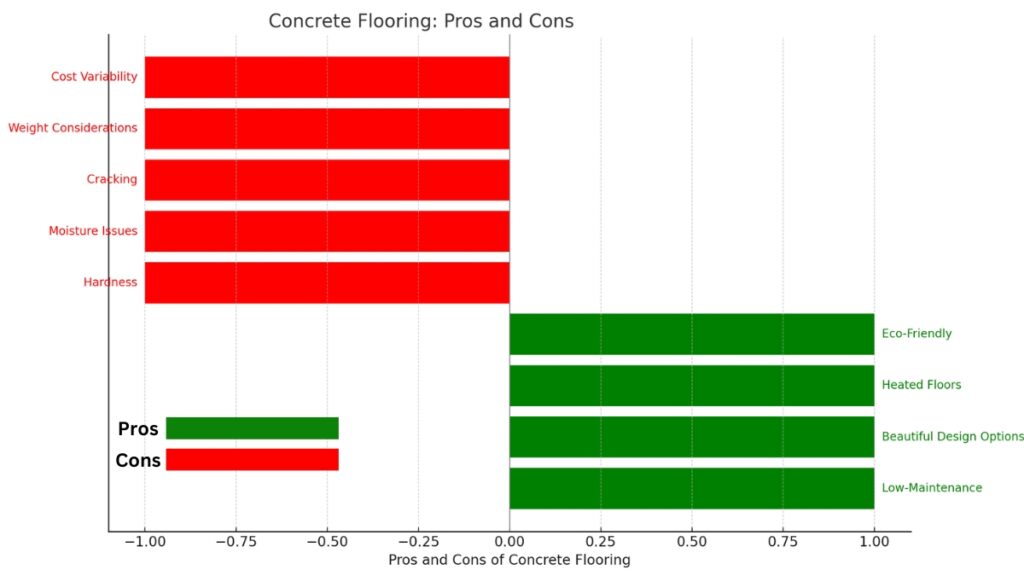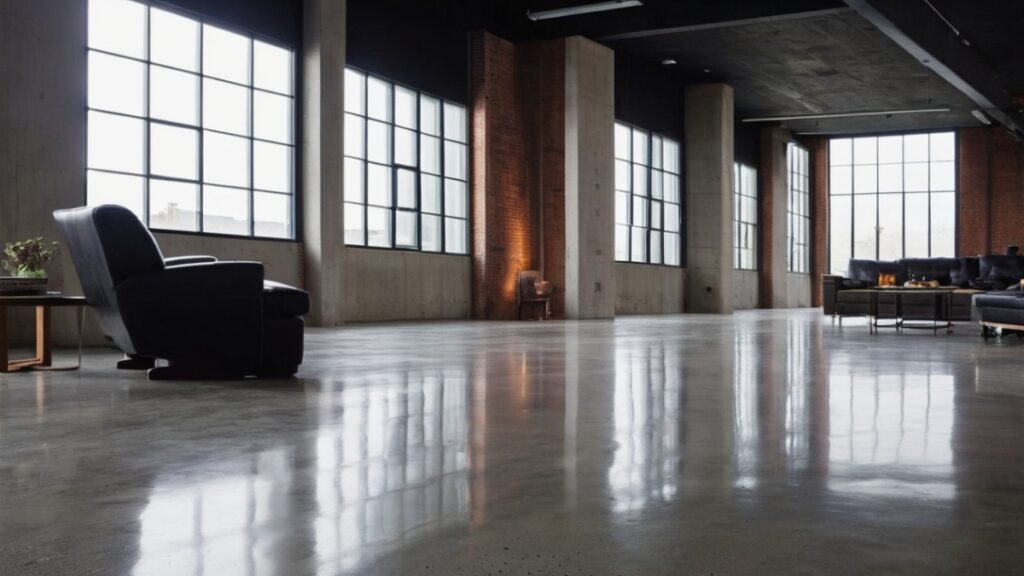Concrete flooring is a staple in modern architecture, beloved for its durability and sleek aesthetics.
It’s a versatile choice that seamlessly fits various design schemes, from industrial lofts to contemporary homes.
In this guide, we will delve into the pros and cons of concrete flooring, providing an analysis to help you to make informed decisions.
Let’s begin!
Pros of Concrete Flooring

1. Low-Maintenance
Concrete flooring stands out not just for its robustness but also for its surprisingly low maintenance needs.
Unlike carpet or hardwood floors, concrete’s solid surface is resistant to stains, spills, and scratches, which makes it ideal for busy households or commercial spaces.
A simple sweeping and occasional mopping with soapy water are sufficient to keep it looking pristine.
Moreover, its durability ensures that it doesn’t demand frequent replacements or repairs, making it cost-effective.
2. Beautiful Design Options
Its beautiful design allows you to tailor the aesthetic of concrete floors to match any interior design scheme.
Concrete can emulate the appearance of more expensive flooring types like natural stone, brick, or intricate tile patterns.
Furthermore, the option for polished concrete can provide a sleek, high-gloss finish that contributes to a modern and sophisticated look.
This versatility ensures that concrete flooring can be artistically adapted to suit the unique style of any space.
3. Heated Floors
One remarkable advantage of concrete flooring is the ability to integrate heated floors, which is a game-changer for comfort.
This system, known as radiant floor heating, consists of installing tubes or cables beneath the concrete surface to generate warmth.
Not only does this feature keep your feet cozy during colder months, but it also helps to evenly distribute heat throughout the room.
This leads to a more efficient and consistent warming method compared to traditional heating systems that can leave cold spots or be draughty.
4. Eco-Friendly
Made from natural materials like limestone, concrete can often be sourced locally, reducing the emissions associated with transportation.
Furthermore, its longevity means that you won’t have to replace it as frequently as other flooring types, which contributes to less waste in landfills.
Plus, concrete’s thermal mass helps to regulate indoor temperatures, leading to lower energy consumption for heating and cooling.
Cons of Concrete Flooring
1. Hardness
While the solidity of concrete flooring is key in its durability and ease of maintenance, it is this very characteristic that also emerges as one of its notable cons.
The inherent hardness can be unforgiving and it can be tough on the feet when standing for prolonged periods.
In households with young children or elderly members, the unforgiving nature of concrete could present safety concerns, as slips and falls on such a rigid surface could lead to serious injuries compared to softer flooring options.
2. Moisture Issues
If a concrete slab isn’t properly sealed on both the top and bottom surfaces, moisture can seep up from the ground, leading to dampness that can affect not just the integrity of the floor, but also the indoor air quality.
This moisture can result in the growth of mold or mildew, which can be difficult to eliminate once it takes hold.
Moreover, if moisture becomes trapped beneath a non-breathable floor covering, it can cause the covering to peel, warp, or become a nesting ground for mold.
Homeowners considering concrete floors must ensure they’re taking steps to mitigate these moisture issues.
3. Cracking
Over time, the natural settlement of a building, changes in temperature, and moisture can lead to the formation of cracks in concrete floors.
These fissures not only detract from the aesthetic appeal but can also represent trip hazards and allow moisture to seep in, potentially causing further damage.
While concrete is known for its strength, it’s not entirely flexible, which means it doesn’t bend or give under pressure and instead, results in cracks that can be costly and complicated to repair.
4. Weight Considerations
The heaviness of concrete means that it may not be suitable for every building structure, especially in older homes where the foundational support may be lacking.
It’s essential to evaluate the strength of the existing subfloors and joists to ensure they can handle the added weight of concrete.
Ignoring these weight considerations could potentially lead to structural issues, costly repairs, and a compromised safety of the inhabitants.
Therefore, before opting for concrete floors, you should consult with a structural engineer to assess the viability and necessary reinforcements.
5. Cost Variability
The cost of concrete flooring can vary widely, from as low as $2 per square foot to upwards of $30 per square foot.
This means that the initial cost quoted for your concrete flooring might not be the final amount you pay.
Factors such as the complexity of installation, the finishing level desired, and any additional treatments for aesthetics or functionality can significantly drive up the price.
Moreover, if your space requires extensive preparation or repair to accommodate the concrete, these hidden costs could take you by surprise.
Find our guides on how to build retaining concrete wall, concrete flooring pros and cons, and concrete flooring images.
Is concrete a good choice for flooring?
Absolutely, concrete can be a fantastic choice for flooring! It’s super tough, meaning it can handle a lot of wear and tear without getting damaged.
People especially love it because it’s low-maintenance and has a sleek look that can be jazzed up with colors or patterns.
Plus, it’s a friend to the environment because it lasts so long and you can even use recycled materials to make it.
In terms of costs, it’s also wallet-friendly over the long term. However, it can feel a bit cold and hard underfoot, so some folks toss down rugs to make it cozier.
Final Thoughts
Concrete flooring stands as a durable and cost-effective solution with a sleek, modern aesthetic, though it may require added insulation for comfort and noise control.
Ready to see how concrete flooring can transform your space?
Get a Free Estimate and explore our services today!

